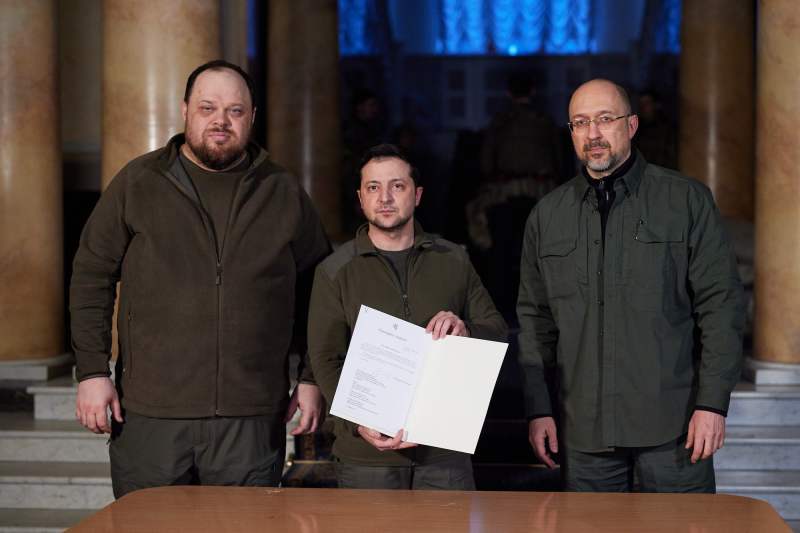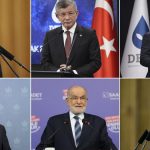In his latest video address to the nation on Wednesday morning, Volodymyr Zelenskiy said Russia was seeking to erase Ukraine, its history and people as he reiterated his appeal for the EU to fast-track its membership application: “This is no time to be neutral.”
There is an urgency to the Ukrainian president’s calls and, naturally, as images of the carnage in Ukraine’s cities beam back to Brussels, there is significant sympathy with his cause.
An emotive speech to the European parliament on Tuesday, in which Zelenskiy had beseeched the union to “prove that you are with us”, won a long, standing ovation and a ringing endorsement from MEPs in a non-binding resolution that called on Ukraine to be given EU candidate status.
Kyiv’s urgency appears to stem from an analysis of a potential “way out” of the conflict with Russia, according to EU officials in almost daily discussions with Zelenskiy’s administration.
If anything approaching coherent can be gleaned from Vladimir Putin’s demands of the Ukrainians, it is that the country should be demilitarised, neutral, and that it should have no prospect of joining the Nato military alliance.
These instructions are evidently unreasonable to make to a sovereign government. But if there is a diplomatic way out of the crisis, sources suggest that some sort of fig leaf to Putin on the military side might form part of an agreement if Kyiv felt confident that its political future, at least, firmly lay with the EU.
“I think one of the reasons that this is important for President Zelenskiy is also potentially in some of the discussions with Russia on a way out,” said one EU official. “I view myself the European Union as a project that is grounded and based upon peace, the solving of conflict through dialogue through working together. I don’t think the European Union has a record of presenting a military threat to any partners.”
One set of talks with Kremlin representatives has been concluded but discussions are expected to resume later on Wednesday.
The official added: “I think in any agreement that President Zelenskiy may reach with President Putin, getting a guarantee that there is support understanding for Ukraine belonging one day to the European Union is likely to be very important for Zelenskiy and for the Ukrainian people.”
Beyond MEPs, the governments of the Baltic states, as well as a number of other countries including Greece, have indicated their support. Ursula von der Leyen, the European Commission president, responded that Ukraine was “one of us and we want them in the EU”.
But there is significant concern in other EU capitals that this is an emotional reaction that will lead to disappointment and bitterness.
Albania, the Republic of North Macedonia, Montenegro, Serbia and Turkey are the current EU candidate countries. But Emmanuel Macron, the French president, has been vocal in stressing that given the failure of the EU to respond adequately to the democratic deficit in Poland and Hungary, or to find a way to have a coordinated foreign policy due to the rules on unanimity, there cannot be any enlargement until there have been treaty reforms.
Back at an EU-Ukraine summit in 2008, the country’s then president, Viktor Yushchenko, said “the message he received from the EU was full of hope and promise”. But Germany, Italy, Belgium, the Netherlands and Luxembourg were among those who blocked any reference in a joint communique to a path to membership.
Today, according to Transparency International’s Corruption Perceptions Index, Ukraine is the second most corrupt in Europe, ahead of Russia. It is now waging a war. Its future borders are unclear. And the path to membership is arduous. If the Council of the European Union agrees, the European Commission will be asked to give an opinion, and that process can take up to 18 months. Ukraine will then have to absorb EU law over an indefinite period of transition.
It is expected that EU leaders will be asked to discuss Ukraine’s application at an upcoming summit. There may be warm words. But Ukraine may be advised not to bank much at all on what could prove to be more empty promises.
By: Daniel Boffey
Source: Guardian



